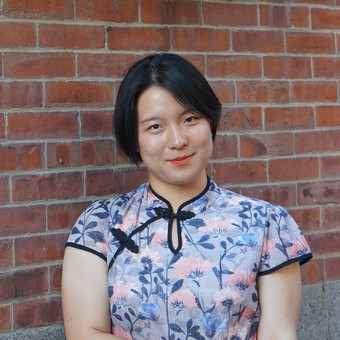Student Profile: Manning Zhang, Sociology and Social Policy
January 19, 2024
Anna Valcour | Graduate School of Arts and Sciences
Manning Zhang, a joint PhD student in Sociology and Social Policy, was awarded funding to participate in two UX design programs in 2022. She enrolled in “RUCD 1401DL Research Methods” at the Rabb School of Continuing Studies at Brandeis and later attended a 5-week UX Design Bootcamp course. Through these experiences, Manning developed skills in qualitative and quantitative research methodologies, statistical analysis, UX research design strategies, and learned industry-specific knowledge.
What inspired you to learn more about UX Design?
When I was in my first or second year as a PhD student, I participated in some professional development activities hosted by Marika McCann and Jon Anjaria, where they introduced the idea of UX design. I’d never heard of it before, but it sounded interesting. So I jumped in! I did some quick calls with Brandeis alums in the industry, and those informational interviews encouraged me to continue finding more resources and seeing if I would be a good candidate for the field. Through these interviews, I began to understand the similarities and differences between academic research and user experience design. While academic research is more paper-oriented, the UX design world focuses on products and services. It’s really interesting and efficient!
Did you have a favorite part of your experience?
I really enjoyed the courses I took with the Rabb School of Continuing Studies at Brandeis. The Rabb School provided a lot of great professional development! They offer multiple courses on UX Design; I took “RUCD 1401DL Research Methods.” I learned specific research design skills, collaborated with another person on a project, implemented our design, and wrote a report on our project. My favorite moment was when I used user maps for the first time. A user map is one of the strategies UX/UI designers employ to visualize the audience’s needs and design products accordingly. I think creating mind maps aligns with my creative thinking process. Another great moment was when we wrote our proposal before we conducted research – that’s so different from what we do in academia. In UX design, you have your hypothesis, but you also need to link the questions, hypotheses, and research together. I was so surprised that finishing a UX project is much faster than conducting academic research. In academia, sometimes it can be hard to see the connection between our very theoretical question and the empirical data we collected – that’s where interpretation kicks in! However, in UX design, every decision you make would be expected to yield a practical result. Straightforwardness is highly encouraged. My other Connected PhD funded experience was in a commercial program, but I found I generally benefited more from Rabb. The instructor was more attentive and available for our questions.
Have you been able to apply UX methodologies to your academic work as well? How has it influenced your work?
I think it has. I used this system when drafting a grant proposal. While I did not end up getting that specific grant, I think it’s very helpful – especially when you’re writing public-facing content. In UX design they discourage you from using jargon — you really need to make your writing clear and accessible. But that doesn’t mean theory is absent in UX design! One of the Rabb School’s UX design courses I didn’t have the opportunity to take was a class on the socioeconomic psychology behind UX design. If people have the opportunity, I do encourage them to take the theory classes before enrolling in the research methods course.
How do you see yourself building upon this experience in the future?
I see a lot of uncertainties and risks in the current academic job market. If possible, I want to obtain a program certificate to be a UX designer through a university program. I feel like these experiences opened my horizons regarding possibilities. It allowed me to explore another possible trajectory that I didn’t have the chance to learn in college.
What advice would you give to PhD students interested in professional development?
Consult with people who share similar identities with you. You can easily find alum through the LinkedIn network. I highly recommend mastering the courage to do some cold calls, even though that sounds intimidating. Most alums are really willing to talk! Of course, when you conduct a cold call, do respect other people’s time and prepare your questions. At the same time please give more credit to yourselves – you could also be a valuable asset for them as well!






